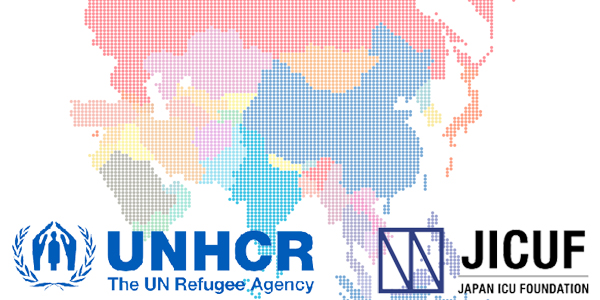JICUF and UNHCR Co-Host Online Discussions on Higher Education for Refugees in the Asia Pacific
 In 2017, JICUF established the Syrian Scholars Initiative (SSI), a full scholarship for Syrian students in Turkey to study at ICU. Since then, four Syrian students have matriculated at ICU, and one more student is preparing to matriculate in spring 2021. JICUF created the program with a desire to support students who may otherwise not have access to higher education and to further diversify ICU’s student body. We have been administering the program in collaboration with ICU and the NPO Japan Association for Refugees (JAR).
In 2017, JICUF established the Syrian Scholars Initiative (SSI), a full scholarship for Syrian students in Turkey to study at ICU. Since then, four Syrian students have matriculated at ICU, and one more student is preparing to matriculate in spring 2021. JICUF created the program with a desire to support students who may otherwise not have access to higher education and to further diversify ICU’s student body. We have been administering the program in collaboration with ICU and the NPO Japan Association for Refugees (JAR).
Multiple universities in Japan offer scholarships for refugee students, but while many institutions recruit refugee students who are already in Japan, SSI recruits students overseas and helps them relocate to Japan to pursue undergraduate education. At the time we created the program, we did not envision attracting international attention. However, SSI came to be viewed by the international refugee advocacy community as a unique private sponsorship program that paves the way for refugee students to move to a third country through educational opportunities. The office of the United Nations High Commissioner for Refugees (UNHCR) saw the potential of SSI becoming a model for others in the region to emulate and increase educational opportunities for refugees. Currently, only 3% of refugees have access to higher education in contrast to 37% of the global population. UNHCR aims to see 15% of refugees access higher education by 2030 (15 by 30), and to achieve this goal, far more institutions across the globe need to be engaged.
In the past few years, JICUF has been increasingly involved in international conversations regarding Education Pathways. Education Pathways are avenues for refugees to relocate to a third country to pursue higher education and receive protection. At the Global Refugee Forum in December 2019, JICUF pledged to co-host with UNHCR a conference in the Asia Pacific region on higher education opportunities for refugees in late 2020. With the onset of the global pandemic, we decided to host a series of online discussions instead of an in-person conference. Our aim was to provide a forum where refugee higher education stakeholders in the region could meet to learn about existing programs and share information on best practices and challenges.
In July, we hosted the first two sessions of the “Online Discussion Series on Higher Education Initiatives for Refugees in Asia and the Pacific” with around 80 participants respectively. Representatives of higher education institutions, NGOs, governments and students from almost 20 countries across the region joined for a lively discussion in Zoom breakout groups. The first session discussed the state of refugee higher education in the region and the second focused on education pathways. After a break in August, more sessions will be organized in September to discuss the transition from secondary to tertiary education and connected learning.
It has been exciting to meet people working towards the same goal and exchanging ideas. We hope that these sessions will lead to new networks and partnerships to support higher education for refugees during and after the COVID-19 crisis.



